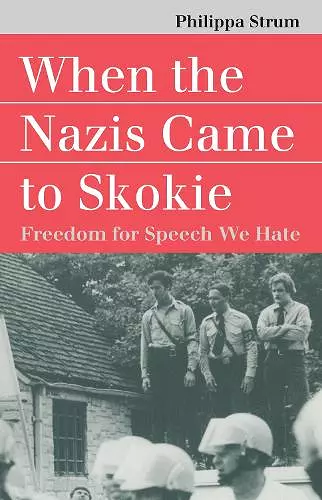When the Nazis Came to Skokie
Freedom for Speech We Hate
Format:Paperback
Publisher:University Press of Kansas
Published:31st Mar '99
Should be back in stock very soon

In the Chicago suburb of Skokie, one out of every six Jewish citizens in the late 1970s was a survivor--or was directly related to a survivor--of the Holocaust. These victims of terror had resettled in America expecting to lead peaceful lives free from persecution. But their safe haven was shattered when a neo-Nazi group announced its intention to parade there in 1977. Philippa Strum's dramatic retelling of the events in Skokie (and in the courts) shows why the case ignited such enormous controversy and challenged our understanding of and commitment to First Amendment values.
The debate was clear-cut: American Nazis claimed the right of free speech while their Jewish "targets" claimed the right to live without intimidation. The town, arguing that the march would assault the sensibilities of its citizens and spark violence, managed to win a court injunction against the marchers. In response, the American Civil Liberties Union took the case and successfully defended the Nazis' right to free speech.
Skokie had all the elements of a difficult case: a clash of absolutes, prior restraint of speech, and heated public sentiment. In recreating it, Strum presents a detailed account and analysis of the legal proceedings as well as finely delineated portraits of the protagonists: Frank Collin, National Socialist Party of America leader and the son of a Jewish Holocaust survivor; Skokie community leader Sol Goldstein, a Holocaust survivor who planned a counterdemonstration against the Nazis; Skokie mayor Albert Smith, who wanted only to protect his townspeople; and ACLU attorney David Goldberger, caught in the ironic position of being a Jew defending the rights of Nazis against fellow Jews. While the ACLU did win the case, it was a costly victory--30,000 of its members left the organization. And in the end, ironically, the Nazis never did march in Skokie.
Forcefully argued, Strum's book shows that freedom of speech must be defended even when the beneficiaries of that defense are far from admirable individuals. It raises both constitutional and moral issues critical to our understanding of free speech and carries important lessons for current controversies over hate speech on college campuses, inviting readers to think more carefully about what the First Amendment really means.
This book is part of the Landmark Law Cases and American Society series.
A meticulous and graceful narrative of one of the most gripping free speech conflicts of modern times." —Rodney A. Smolla, author of Free Speech in an Open Society
"Strum succeeds brilliantly in telling the two stories of Skokie-the constitutional struggle over free speech and the human agony and conflict that permeated it. In clear, rigorous, and vivid prose, she recreates the legal and political culture when the case arose in the 1970s and then shows how more recent intellectual theories bear on what happened. A simply wonderful book." —Norman Dorsen, Stokes Professor, NYU, and president, ACLU, 1976-1991
"Strum paints a remarkably complete picture of the entire Skokie controversy and helps put the debate over the First Amendment protection for 'hate speech' into meaningful perspective." —David Goldberger, Ohio State University College of Law professor and former ACLU attorney for Frank Collin and the National Socialist Party of America
"A book that students will read eagerly and that teachers will find a pleasure to use." —Melvin I. Urofsky, author of Affirmative Action on Trial: Sex Discrimination in Johnson v. Santa Clara
ISBN: 9780700609413
Dimensions: 215mm x 141mm x 13mm
Weight: 232g
184 pages